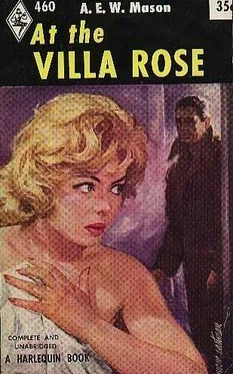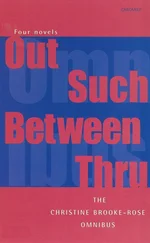A Mason - At the Villa Rose
Здесь есть возможность читать онлайн «A Mason - At the Villa Rose» весь текст электронной книги совершенно бесплатно (целиком полную версию без сокращений). В некоторых случаях можно слушать аудио, скачать через торрент в формате fb2 и присутствует краткое содержание. Год выпуска: 1910, Жанр: Классический детектив, на английском языке. Описание произведения, (предисловие) а так же отзывы посетителей доступны на портале библиотеки ЛибКат.
- Название:At the Villa Rose
- Автор:
- Жанр:
- Год:1910
- ISBN:нет данных
- Рейтинг книги:5 / 5. Голосов: 1
-
Избранное:Добавить в избранное
- Отзывы:
-
Ваша оценка:
- 100
- 1
- 2
- 3
- 4
- 5
At the Villa Rose: краткое содержание, описание и аннотация
Предлагаем к чтению аннотацию, описание, краткое содержание или предисловие (зависит от того, что написал сам автор книги «At the Villa Rose»). Если вы не нашли необходимую информацию о книге — напишите в комментариях, мы постараемся отыскать её.
At the Villa Rose — читать онлайн бесплатно полную книгу (весь текст) целиком
Ниже представлен текст книги, разбитый по страницам. Система сохранения места последней прочитанной страницы, позволяет с удобством читать онлайн бесплатно книгу «At the Villa Rose», без необходимости каждый раз заново искать на чём Вы остановились. Поставьте закладку, и сможете в любой момент перейти на страницу, на которой закончили чтение.
Интервал:
Закладка:
"There are two thousand louis in the bank," he cried. "Who will take on the bank for two thousand louis?"
No one, however, was willing. A fresh bank was put up for sale, and Wethermill, still sitting in the dealer’s chair, bought it. He spoke at once to an attendant, and the man slipped round the table, and, forcing his way through the crowd, carried a message to the girl in the black hat. She looked towards Wethermill and smiled; and the smile made her face a miracle of tenderness. Then she disappeared, and in a few moments Ricardo saw a way open in the throng behind the banker, and she appeared again only a yard or two away, just behind Wethermill. He turned, and taking her hand into his, shook it chidingly.
"I couldn’t let you play against me, Celia," he said, in English; "my luck’s too good tonight. So you shall be my partner instead. I’ll put in the capital and we’ll share the winnings."
The girl’s face flushed rosily. Her hand still lay clasped in his. She made no effort to withdraw it.
"I couldn’t do that," she exclaimed.
"Why not?" said he. "See!" and loosening her fingers he took from them the five-louis note and tossed it over to the croupier to be added to his bank. "Now you can’t help yourself. We’re partners."
The girl laughed, and the company at the table smiled, half in sympathy, half with amusement. A chair was brought for her, and she sat down behind Wethermill, her lips parted, her face joyous with excitement. But all at once Wethermill’s luck deserted him. He renewed his bank three times, and had lost the greater part of his winnings when he had dealt the cards through. He took a fourth bank, and rose from that, too, a loser.
"That’s enough, Celia," he said. "Let us go out into the garden; it will be cooler there."
"I have taken your good luck away," said the girl remorsefully. Wethermill put his arm through hers.
"You’ll have to take yourself away before you can do that," he answered, and the couple walked together out of Ricardo’s hearing.
Ricardo was left to wonder about Celia. She was just one of those problems which made Aix-les-Bains so unfailingly attractive to him. She dwelt in some street of Bohemia; so much was clear. The frankness of her pleasure, of her excitement, and even of her distress proved it. She passed from one to the other while you could deal a pack of cards. She was at no pains to wear a mask. Moreover, she was a young girl of nineteen or twenty, running about those rooms alone, as unembarrassed as if she had been at home. There was the free use, too, of Christian names. Certainly she dwelt in Bohemia. But it seemed to Ricardo that she could pass in any company and yet not be overpassed. She would look a little more picturesque than most girls of her age, and she was certainly a good deal more soignee than many, and she had the Frenchwoman’s knack of putting on her clothes. But those would be all the differences, leaving out the frankness. Ricardo wondered in what street of Bohemia she dwelt. He wondered still more when he saw her again half an hour afterwards at the entrance to the Villa des Fleurs. She came down the long hall with Harry Wethermill at her side. The couple were walking slowly, and talking as they walked with so complete an absorption in each other that they were unaware of their surroundings. At the bottom of the steps a stout woman of fifty-five over-jewelled, and over-dressed and raddled with paint, watched their approach with a smile of good-humoured amusement. When they came near enough to hear she said in French:
"Well, Celie, are you ready to go home?"
The girl looked up with a start.
"Of course, madame," she said, with a certain submissiveness which surprised Ricardo. "I hope I have not kept you waiting."
She ran to the cloak-room, and came back again with her cloak.
"Good-bye, Harry," she said, dwelling upon his name and looking out upon him with soft and smiling eyes.
"I shall see you tomorrow evening," he said, holding her hand. Again she let it stay within his keeping, but she frowned, and a sudden gravity settled like a cloud upon her face. She turned to the elder woman with a sort of appeal.
"No, I do not think we shall be here, tomorrow, shall we, madame?" she said reluctantly.
"Of course not," said madame briskly. "You have not forgotten what we have planned? No, we shall not be here tomorrow; but the night after-yes."
Celia turned back again to Wethermill.
"Yes, we have plans for tomorrow," she said, with a very wistful note of regret in her voice; and seeing that madame was already at the door, she bent forward and said timidly, "But the night after I shall want you."
"I shall thank you for wanting me," Wethermill rejoined; and the girl tore her hand away and ran up the steps.
Harry Wethermill returned to the rooms. Mr. Ricardo did not follow him. He was too busy with the little problem which had been presented to him that night. What could that girl, he asked himself, have in common with the raddled woman she addressed so respectfully? Indeed, there had been a note of more than respect in her voice. There had been something of affection. Again Mr. Ricardo found himself wondering in what street in Bohemia Celia dwelt-and as he walked up to the hotel there came yet other questions to amuse him.
"Why," he asked, "could neither Celia nor madame come to the Villa des Fleurs tomorrow night? What are the plans they have made? And what was it in those plans which had brought the sudden gravity and reluctance into Celia’s face?"
Ricardo had reason to remember those questions during the next few days, though he only idled with them now.
CHAPTER II
It was on a Monday evening that Ricardo saw Harry Wethermill and the girl Celia together. On the Tuesday he saw Wethermill in the rooms alone and had some talk with him.
Wethermill was not playing that night, and about ten o’clock the two men left the Villa des Fleurs together.
"Which way do you go?" asked Wethermill.
"Up the hill to the Hotel Majestic," said Ricardo.
"We go together, then. I, too, am staying there," said the young man, and they climbed the steep streets together. Ricardo was dying to put some questions about Wethermill’s young friend of the night before, but discretion kept him reluctantly silent. They chatted for a few moments in the hall upon indifferent topics and so separated for the night. Mr. Ricardo, however, was to learn something more of Celia the next morning; for while he was fixing his tie before the mirror Wethermill burst into his dressing-room. Mr. Ricardo forgot his curiosity in the surge of his indignation. Such an invasion was an unprecedented outrage upon the gentle tenor of his life. The business of the morning toilette was sacred. To interrupt it carried a subtle suggestion of anarchy. Where was his valet? Where was Charles, who should have guarded the door like the custodian of a chapel?
"I cannot speak to you for at least another half-hour," said Mr. Ricardo, sternly.
But Harry Wethermill was out of breath and shaking with agitation.
"I can’t wait," he cried, with a passionate appeal. "I have got to see you. You must help me, Mr. Ricardo-you must, indeed!"
Ricardo spun round upon his heel. At first he had thought that the help wanted was the help usually wanted at Aix-les-Bains. A glance at Wethermills face, however, and the ringing note of anguish in his voice, told him that the thought was wrong. Mr. Ricardo slipped out of his affectations as out of a loose coat. "What has happened?" he asked quietly.
"Something terrible." With shaking fingers Wethermill held out a newspaper. "Read it," he said.
It was a special edition of a local newspaper, Le Journal de Savoie, and it bore the date of that morning.
Читать дальшеИнтервал:
Закладка:
Похожие книги на «At the Villa Rose»
Представляем Вашему вниманию похожие книги на «At the Villa Rose» списком для выбора. Мы отобрали схожую по названию и смыслу литературу в надежде предоставить читателям больше вариантов отыскать новые, интересные, ещё непрочитанные произведения.
Обсуждение, отзывы о книге «At the Villa Rose» и просто собственные мнения читателей. Оставьте ваши комментарии, напишите, что Вы думаете о произведении, его смысле или главных героях. Укажите что конкретно понравилось, а что нет, и почему Вы так считаете.












